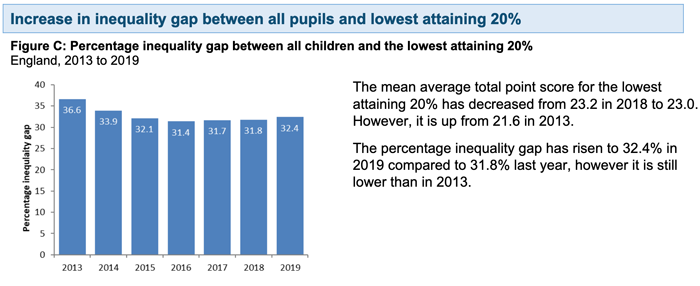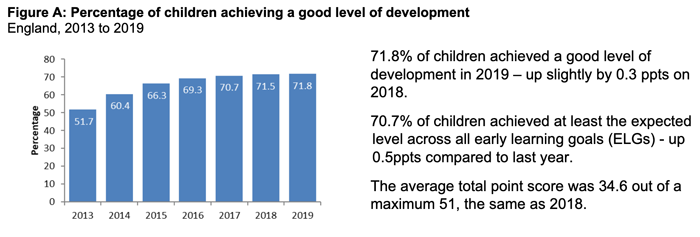Early years inequality gap grows
Joe Lepper
Thursday, October 17, 2019
Early years development has continued to improve, but the gap between the lowest achievers and their peers is still growing, government figures show.

The Department for Education's Early Years Foundation Stage (EYFS) Profile results show that 71.8 per cent of children achieved a good level of development in 2019.
This is a slight increase of 0.3 of a percentage point on last year's figure of 71.5 per cent but the rise is at a slower rate than the 0.8 percentage point increase between 2018 and 2017.
Meanwhile, the inequality gap between the lowest attaining fifth of children and their peers has grown for the third year in a row and at a faster rate than the previous two years.
The gap has risen to 32.4 per cent in 2019, compared to 31.8 per cent in 2018.
This is at a faster rate than recent rises since the gap began increasing in 2017.
The mean average total point score for the lowest attaining fifth of children has also fallen, from 23.2 in 2018, to 23 this year.

Source: DfE
Purnima Tanuku, chief executive of National Day Nurseries Association (NDNA) said: "It's good news that children's overall development has improved since last year, which is testament to the high-quality provision that private, voluntary and independent nurseries deliver to the majority of children in England.
"But we are worried that the gap between the lowest performing children and their peers continues to widen. The reduced number of two-year-olds from disadvantaged backgrounds receiving funded places and the higher numbers of nursery closures in deprived areas will not be helping this situation.
"Research shows that children who attend high quality nurseries have better communication and social skills too, so the government must invest sufficiently in childcare to make sure that early years education is accessible for all children."

Source: DfE
The Early Years Alliance is concerned that almost one in three children are not developing at a good level by the time they reach the end of their early years education, and echoed calls for proper funding.
"It is undoubtedly positive that the majority of young children are progressing well by the end of the Early Years Foundation Stage," said Early Years Alliance chief executive Neil Leitch.
"That said, the fact remains that nearly a third are still not achieving a good level of development at the end of reception, and it is concerning to see that the progress that has been made over recent years is beginning to stall.
"All children, regardless of background, deserve the best possible start in life and government must recognise that adequate investment is crucial in supporting providers to make this possible."
The government is considering refreshing the EYFS and Leitch urges ministers to ensure it continues to measure a broad range of development skills.
"With a consultation on the future of the EYFS imminent, these results also demonstrate the importance of seeing a child's development in the round, rather than focussing on a narrow set of formal skills," he said.
"Many in the sector are rightly concerned that a broader, observation-based approach to the early years is falling out of favour, and being replaced with a focus on easy-to-measure skills, to the detriment of children's early learning."




